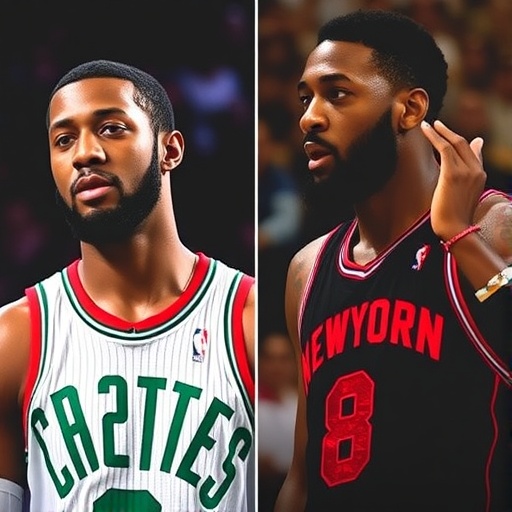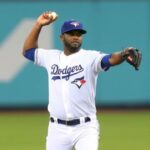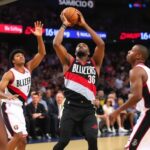Indictments Drop: NBA Stars Terry Rozier and Chauncey Billups Caught in Federal Sting
In a bombshell development that has sent shockwaves through the basketball world, federal prosecutors in New York have indicted Miami Heat guard Terry Rozier and Portland Trail Blazers head coach Chauncey Billups on charges related to a massive sports gambling operation tied to organized crime. The allegations, unsealed in Manhattan federal court on Tuesday, paint a picture of high-stakes poker games and rigged NBA bets orchestrated by four of New York’s five major crime families. This scandal not only tarnishes two prominent figures in the league but also raises questions about the integrity of professional basketball at its highest levels.
- Indictments Drop: NBA Stars Terry Rozier and Chauncey Billups Caught in Federal Sting
- Mob Connections Exposed: Four New York Families Fuel the Gambling Empire
- Inside the Rigged Games: How the NBA Betting Scheme Unfolded
- League in Turmoil: NBA’s Swift Actions and Broader Fallout
- Legal Reckoning Looms: Trials, Penalties, and NBA’s Path Forward
Rozier, a 29-year-old All-Star known for his explosive scoring and defensive prowess, and Billups, the five-time NBA champion and respected coach, were named in a 45-count indictment that accuses them of participating in illegal gambling activities dating back to 2019. According to court documents, the duo allegedly facilitated bets on NBA games, including insider information that influenced outcomes, in exchange for substantial kickbacks from mob-linked bookmakers. The operation reportedly generated over $50 million in illicit profits, with bets placed through underground networks spanning Las Vegas to Atlantic City.
“This is a dark day for the NBA,” said U.S. Attorney Damian Williams during a press conference outside the courthouse. “When organized crime infiltrates the heart of American sports, it undermines the trust fans place in the game we all love.” Williams highlighted how the scheme exploited vulnerabilities in sports gambling, which has boomed since the 2018 Supreme Court decision legalizing it in most states.
The indictments stem from a multi-year investigation by the FBI’s New York field office, codenamed Operation High Roller, which involved wiretaps, undercover agents, and surveillance of luxury poker rooms in Manhattan and Brooklyn. Sources close to the probe revealed that Rozier and Billups were introduced to the ring through mutual connections in the Detroit sports scene, where Billups began his coaching career and Rozier honed his skills in the Pistons’ organization.
Mob Connections Exposed: Four New York Families Fuel the Gambling Empire
At the core of this NBA scandal lies a intricate web of organized crime, with the Genovese, Gambino, Lucchese, and Bonanno families allegedly serving as the backbone of the illegal gambling syndicate. Federal authorities claim these groups, long synonymous with New York’s underworld, adapted their traditional rackets to the digital age by running sophisticated online betting platforms disguised as legitimate sportsbooks.
According to the indictment, the crime families controlled a network of over 200 runners and bookies who placed wagers on NBA games, focusing on point spreads and player props. High-profile games involving the Heat and Trail Blazers were prime targets, with insiders like Rozier allegedly providing tips on player fatigue and lineup changes. Billups, with his coaching access, is accused of influencing game strategies to sway outcomes, such as extending rotations to affect over/under totals.
One particularly damning piece of evidence is a series of recorded conversations from 2021, where a Gambino associate, identified only as “Vinny the Whale,” discusses a $2 million payout tied to a Heat playoff win. “These NBA guys are gold,” the associate is quoted as saying in court filings. “They give us the edge, we give them the cash—no questions asked.”
The Bonanno family’s role was logistical, reportedly laundering proceeds through front businesses like car washes and construction firms in Queens. FBI estimates suggest the families skimmed 20-30% of all bets, amassing a war chest that funded other criminal enterprises. This isn’t the first time organized crime has tangled with sports; historical precedents include the 1919 Black Sox scandal in baseball and more recent NFL betting probes. But the scale here, involving sitting NBA personnel, marks a new low.
Experts on mob dynamics, such as former FBI agent Joe Pistone—famous for his “Donnie Brasco” infiltration—commented on the evolution of these groups. “The families have gone legit on the surface,” Pistone told reporters. “But gambling remains their lifeblood, especially with sports betting apps making it easier than ever to hide in plain sight.”
Inside the Rigged Games: How the NBA Betting Scheme Unfolded
The mechanics of the gambling operation reveal a sophisticated blend of old-school mob tactics and modern technology, turning NBA games into predictable cash cows for the syndicate. Prosecutors allege that the ring targeted mid-season matchups and playoffs, where stakes—and emotions—run highest. For instance, a February 2022 game between the Heat and Knicks saw unusual betting patterns, with heavy action on Rozier’s underperformance, which aligned with his alleged instructions to take fewer shots.
Billups’ involvement reportedly began innocently enough, with casual poker nights in Portland that escalated into full-blown gambling sessions. Court records detail how he hosted private games at a Blazers practice facility, inviting mob-connected high rollers who wagered six figures per hand. “It started as fun, but the debts piled up,” an anonymous source familiar with the probe said. “Chauncey needed the wins, and the families provided the fixes.”
Rozier, meanwhile, is accused of using encrypted apps like Signal to communicate bet details, sharing stats that weren’t public yet. One indictment count cites a text exchange where he tips off a Lucchese operative about a teammate’s injury, leading to a $500,000 parlay on the Heat’s loss. The scandal‘s reach extends beyond the court; federal agents raided several New York casinos last month, seizing servers that held transaction logs linking bets to crime family shell companies.
Statistics underscore the NBA‘s vulnerability: According to the American Gaming Association, legal sports gambling hit $93 billion in wagers in 2023, with basketball accounting for 15% of the action. Illegal offshore books, however, siphon off billions more, creating fertile ground for organized crime. The league’s own integrity monitors flagged anomalies in 12 games last season, but none connected to this ring until the FBI tipped them off.
Key Players in the Scheme
- Terry Rozier: Accused of 15 counts of wire fraud and conspiracy; faces up to 20 years if convicted.
- Chauncey Billups: Charged with racketeering and money laundering; his coaching future hangs in the balance.
- Mob Figures: Over 20 associates indicted, including Genovese capo Anthony “Fat Tony” Salerno’s nephew.
Victims of the scheme include everyday bettors who unknowingly funded the mob through manipulated odds. One Las Vegas gambler, speaking on condition of anonymity, lost $100,000 on a rigged Trail Blazers game. “I thought it was bad luck,” he said. “Now I know it was fixed from the top.”
League in Turmoil: NBA’s Swift Actions and Broader Fallout
The NBA wasted no time responding to the scandal, suspending Rozier indefinitely and placing Billups on administrative leave pending the investigation’s outcome. Commissioner Adam Silver issued a statement emphasizing the league’s zero-tolerance policy: “Integrity is the foundation of our sport. We are cooperating fully with authorities and will root out any corruption wherever it hides.”
Behind the scenes, the NBA has ramped up its partnership with Genius Sports, enhancing AI-driven monitoring for betting irregularities. Last year, the league invested $10 million in integrity programs, including player education on gambling risks. Yet, this incident exposes gaps; a 2023 survey by the Players Association found 40% of athletes had been approached about bets, though few reported it.
The ripple effects are already felt across the league. Sponsors like Nike and State Farm are reviewing endorsements, with Rozier’s shoe deal in jeopardy. Fan reactions on social media range from outrage to conspiracy theories, with #NBAMafia trending worldwide. Portland’s front office, reeling from Billups’ suspension, is scrambling for interim coaching options, potentially eyeing assistants like Nate Bjorkgren.
Economically, the scandal could dent the NBA‘s $10 billion annual revenue, especially from betting partnerships with DraftKings and FanDuel. Analysts predict a 5-10% dip in legal wager volume if trust erodes further. “This isn’t just about two guys,” said sports economist Andrew Zimbalist. “It’s a wake-up call for how organized crime preys on the gambling boom.”
Legal Reckoning Looms: Trials, Penalties, and NBA’s Path Forward
As the dust settles, the road ahead for Rozier, Billups, and the implicated crime families promises intense legal battles. The trial, set for early 2025 in federal court, could last months, featuring testimony from cooperating witnesses and forensic analysis of betting data. Prosecutors are seeking asset forfeitures totaling $30 million, including luxury properties in Miami and New York linked to the defendants.
Rozier, through his attorney, maintains his innocence: “Terry is a dedicated athlete who’s been unfairly targeted. We’ll fight these baseless charges.” Billups echoed similar sentiments, calling the allegations “a complete fabrication designed to sensationalize a story.” But with mounting evidence, including financial records showing unexplained deposits, their defenses face steep odds.
For the NBA, the scandal heralds a era of heightened scrutiny. The league plans to mandate annual gambling audits for all personnel and expand whistleblower protections. Silver has hinted at collaborating with Congress on federal regulations for sports betting, potentially curbing organized crime‘s influence.
Looking forward, this case could redefine how the NBA safeguards its brand. With the 2024-25 season underway, fans will watch closely for signs of reform. If history is any guide—from Pete Rose’s lifetime ban in MLB to Tim Donaghy’s NBA referee scandal—the league must act decisively to restore faith. As one insider put it, “The ball is in the NBA’s court now—will they shoot straight, or risk another miss?” The implications extend beyond basketball, signaling a broader crackdown on illicit gambling in American sports, ensuring that the game remains pure for generations to come.








